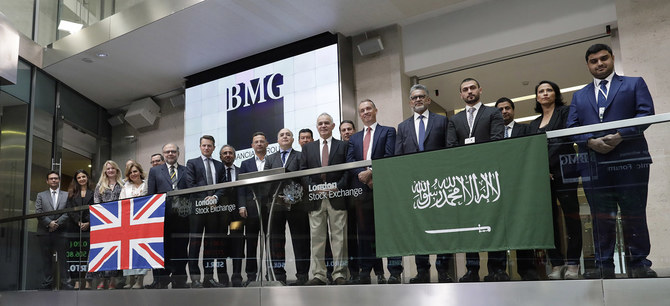LONDON: Investors and experts from across Saudi Arabia, the UK and Europe gathered at the BMG Economic Forum’s annual meeting at the London Stock Exchange on Tuesday to highlight key investment and cooperation opportunities with the Kingdom.
The conference, part of BMG’s Annual Summer Retreat, shone a light on multiple topics for investors including geopolitics, dual listings, key growth sectors, small and medium enterprises, and the future of fintech.
“We chose the London Stock Exchange to host our forum because it is the oldest exchange in the world, which will help to broaden our message and reach global investors to promote the promising inward investments into the Kingdom,” Basil Al-Ghalayini, CEO of BMG Financial Group, said in his opening remarks.
The event sought to complement the BMG group’s objective of “creating unique relationships with its clients through collaboration and partnerships (and) educate the business community it serves beyond revenues and bottom lines,” Al-Ghalayini added.
The annual gathering brings together government officials, decision-makers, and global investors. It is a platform to discuss and explore the latest investment opportunities in Saudi Arabia and guide international companies wishing to expand their presence in the Kingdom.
“The Saudi government is having a clear investment agenda when it comes to real estate. It is very important to engage with the British investors and to increase the awareness about the potential of Saudi overall and the opportunities we have within the Saudi economy,” Mohammad Shahin, group CFO at Al-Shair Group, told Arab News.
Among this year’s prominent speakers were Dr. Nabeel Koshak, CEO and board member of Saudi Venture Capital Company; Abdulaziz Al-Ghifaili, UK international office director for the Ministry of Investment, and Tom Attenborough, the head of International Development at the London Stock Exchange Group.
The forum, titled “Investing for sustainable growth: The Saudi opportunity now and beyond” comes at a crucial moment for Saudi Arabia as it promotes the Kingdom’s 2030 Vision — with Crown Prince Mohammed bin Salman just announcing his designs for The Line, one of several mega-projects now underway as part of the country’s economic diversification plan.
“The crown prince has a vision, and that is Vision 2030, to open up to the world, to tourists. This means the Kingdom is building a lot of hotels and resorts and (I’ve recently been) speaking to hundreds of restaurants which have been opening every month in Saudi Arabia,” Vittorio Rocchi, CEO at Sitaf Foods, told Arab News.
“So for us it is a great opportunity to grow our family business,” he added, emphasizing how strategic it has been for them to list with Saudi Arabia’s Nomu market.
One of the panels, moderated by Arab News’ Tarek Ali Ahmad, the head of the newspaper’s Research and Studies Unit and its media editor, saw Cevdet Caner, CEO of Aggregate Holdings, and Mahfuz Rahman, partner of BMG Europe, discussing recent geopolitical developments affecting asset allocation models in Europe and around the world.
“Supply chain, inflation and the Russia-Ukraine conflict have impacted markets and created volatility,” Rahman said during the panel. “But opportunities are there, they are just more sector oriented.”
Caner, however, saw advantages from market downfalls, stating: “I think maybe I’m more bullish than bearish, but I think a lot of investors would dream of making an even bigger killing and wait for the markets to go down further.”
The forum continued with Zahara Malik, CEO and co-founder of asset management company Grosvenor Capital, and Attenborough of the LSE, discussing the opportunity for dual listings of companies operating globally.
Attenborough said the number of institutional investors in LSE’s listed shares, who also invest in Saudi Arabia, was “growing year by year.” However, these investors are still only 200 compared to the 3,800 institutional investors in London overall. Dual listings represent a “huge opportunity for companies to expand their international investor base” he said.




















